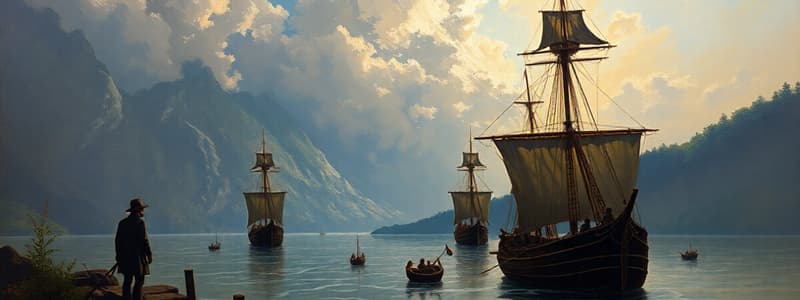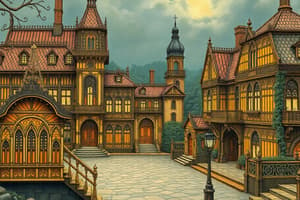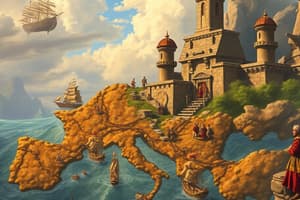Podcast
Questions and Answers
What were the three major reasons Europeans explored during the Age of Exploration?
What were the three major reasons Europeans explored during the Age of Exploration?
- Gold, land, and trade
- Power, religion, and knowledge
- God, glory, and gold (correct)
- Exploration, settlement, and wealth
Which economic system emerged in the late 1400s that encouraged private ownership of wealth?
Which economic system emerged in the late 1400s that encouraged private ownership of wealth?
- Mercantilism
- Communism
- Feudalism
- Capitalism (correct)
What motivated many early explorers to seek new trade routes?
What motivated many early explorers to seek new trade routes?
- The immediate need for more land
- The pursuit of military glory
- The desire to find and sell exotic goods for profit (correct)
- The search for new cultures to understand
During the early 1500s, which significant religious movement aimed to reform the Catholic Church?
During the early 1500s, which significant religious movement aimed to reform the Catholic Church?
Which of the following products was NOT in demand by Europeans during the Age of Exploration?
Which of the following products was NOT in demand by Europeans during the Age of Exploration?
What motivated the Catholic Church to intensify its efforts in spreading Catholicism?
What motivated the Catholic Church to intensify its efforts in spreading Catholicism?
Which major conflict was primarily a competition for supremacy between France and Austria?
Which major conflict was primarily a competition for supremacy between France and Austria?
What was one consequence of the Catholic Church’s efforts to spread its faith?
What was one consequence of the Catholic Church’s efforts to spread its faith?
What was a primary reason for European royal families to compete with each other during the period of exploration?
What was a primary reason for European royal families to compete with each other during the period of exploration?
What was a direct outcome for non-Catholic individuals in regions where Catholicism was spread aggressively?
What was a direct outcome for non-Catholic individuals in regions where Catholicism was spread aggressively?
Flashcards
Age of Exploration
Age of Exploration
The period between the 1400s and 1500s where European explorers sailed to new lands in search of riches, religious conversions, and glory.
Capitalism
Capitalism
An economic system where individuals own the means of production (like land and factories) and can profit from their work.
Bourgeoisie
Bourgeoisie
A middle class of business owners and bankers who had money to spend and helped grow the European economy.
Protestant Reformation
Protestant Reformation
Signup and view all the flashcards
Lure of Gold
Lure of Gold
Signup and view all the flashcards
Catholic Church's Response to Declining Popularity
Catholic Church's Response to Declining Popularity
Signup and view all the flashcards
European Rivalries and the Quest for Glory
European Rivalries and the Quest for Glory
Signup and view all the flashcards
Exploration and Colonization: A Source of National Power
Exploration and Colonization: A Source of National Power
Signup and view all the flashcards
Religious Freedom: A Driving Force for Exploration
Religious Freedom: A Driving Force for Exploration
Signup and view all the flashcards
European Motives for Exploration and Colonization
European Motives for Exploration and Colonization
Signup and view all the flashcards
Study Notes
Age of Exploration Motives
- Europeans explored in the 1400s and 1500s for three main reasons: gold, God, and glory.
The Lure of Gold
- Capitalism, with private ownership of wealth, developed in the late 1400s.
- This led to economic growth and a new middle class (bourgeoisie) with more disposable income.
- Europeans desired goods from other parts of the world (spices, tea, sugar, silk).
- Exploration was driven by the desire for trade routes to acquire these goods cheaply and sell them with profit.
The Love of God
- The Protestant Reformation challenged the Catholic Church's authority in the early 1500s.
- The Reformation, led by Martin Luther, led to the creation of the Lutheran Church.
- The Catholic Church tried to increase its spread globally, leading to exploration and colonization.
- Religious differences triggered conflicts and persecution.
- Exploration also became a refuge for people seeking religious freedom.
The Quest for Glory
- European royal families competed for power through conflict (e.g., Thirty Years' War)
- Competition for global wealth and resources was a key factor in exploration & colonization.
- Explorers claimed new lands for their rulers and countries, seeking prestige and resources.
- Colonization, like Spain's control of Central and South America, brought wealth and glory to nations.
Studying That Suits You
Use AI to generate personalized quizzes and flashcards to suit your learning preferences.




